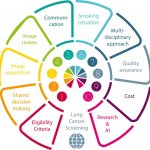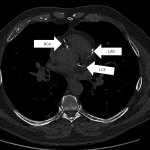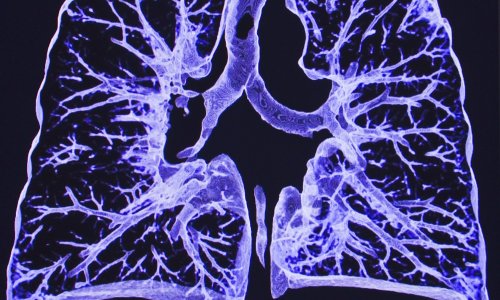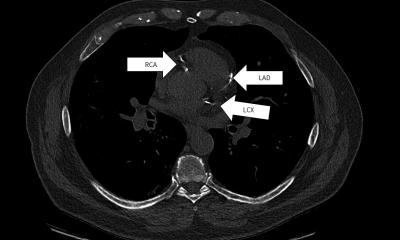
Article • Launch of new national program
A new “impulse” for equitable lung cancer screening in France
Lung cancer is the leading cause of cancer death in the EU, yet no organized screening program exists to detect the disease before symptoms appear. This September, France will strike back with an ambitious pilot program that could boost European lung cancer screening. Professor Marie-Pierre Revel presented the details at the French Thoracic Imaging Society Spring Days in Marseille last month, highlighting the urgency and immense preventive potential of the project.
By Mélisande Rouger
Detect early, treat only when necessary, and protect the vulnerable from unnecessary stress or harm: This is the essence of IMPULSION (Implementation of pulmonary cancer screening by scanner in the population), France’s pioneering pilot programme for population-based lung cancer screening, the Head of the Imaging Department at Cochin Hospital in Paris outlined.
A structured approach to early detection
The programme will include 20,000 participants aged 50-74, all with a significant smoking history – defined as at least one pack per day for 20 years, either current smokers or those who quit less than two decades ago. The participants will undergo three CT scans over four years: baseline, one-year follow-up, and a final scan after two more years if previous results are normal.
The new programme builds on the CASCADE study from 2022, addressing key challenges identified. ‘We learned from CASCADE that not every nodule is cancer,’ Revel said. ‘And not every positive scan requires a biopsy or surgery.’ The design prioritizes minimizing overdiagnosis, patient anxiety, and unnecessary interventions while maintaining effective early detection.
Recommended article

Article • Updates: France, Germany, the UK, Croatia, Hungary, Poland, Russia
Pan-European lung cancer screening
Pan-European lung cancer screening is challenged due to the range of approaches in different countries. As attitudes towards smoking and smoking cessation programmes vary, experts are attempting to establish more unified lung cancer screening. The introduction of consistent screening were outlined at the online ECR 2021, with presentations highlighting the current position in several countries.
Expanding training, exploring AI potential
One of Impulsion’s most notable innovations lies in its radiologist training model. Drawing from the certification programme of the previous study, endorsed by the European Society of Radiology (ESR), the team has developed a rigorous national training pathway for general radiologists – those outside thoracic specialties – who will read the scans.
Artificial intelligence (AI) will also play a central role in the screening process, Revel explained. The first 2,500 cases will undergo double reading by both radiologists and AI. ‘The idea is that AI could become the second reader,’ she explained. ‘If the first radiologist and AI agree, a second human reader may no longer be necessary.’ This “belt and braces” approach aims to help standardize detection while addressing resource limitations in a field where highly trained thoracic radiologists remain scarce.
Reaching beyond the usual suspects
To recruit participants, the programme will access occupational health networks at major French employers like Stellantis, Danone and SNCF. This strategy puts a greater emphasis on target populations which are traditionally underrepresented in screening efforts. ‘These physicians are trained, motivated, and connected to people who may never set foot in a pneumologist’s office,’ Revel noted. ‘This is true public health outreach, and it costs nothing.’
Beyond its initial focus on lung cancer, the programme will identify coronary artery calcifications visible on low-dose CT scans, potentially preventing life-threatening cardiovascular events. Participants will also receive smoking cessation counselling, expanding the programme's preventive impact. ‘We won’t just save lives by finding cancer,’ the expert said. ‘We will also prevent heart attacks and help people quit smoking.’
Recommended article

News • Coronary artery disease detection
Low-dose chest CT may detect more than just lung cancer
As new research shows, low-dose chest computed tomography (CT) can identify coronary artery calcium, a strong risk factor for coronary artery disease (CAD), in patients without cardiac symptoms.
With its €10 million funding from the French National Cancer Institute (INCa), supported by social security and regional health authorities, the IMPULSION programme will initially include only five regions in 2025, with a national rollout envisioned for 2026.
Revel’s team is exploring the potential of ultra-low dose scanning technology, testing whether radiation exposure equivalent to a chest X-ray can still yield actionable diagnostic data without compromising AI performance. ‘The scanner is still an irradiating tool, but we can – and must – do better,’ she emphasized.
For Revel, who lost her cousin to lung cancer, the new programme is also a very personal matter. She herself underwent screening and is constantly looking for new ways to reach wider audiences. ‘Science matters,’ she said. ‘But if you want to change society, it’s stories – not statistics – that move people.’
As Europe is redoubling its efforts for lung cancer screening, IMPULSION could become a model for implementing precision medicine while increasing health equity. And in the words of its creator, it is not just about saving lungs, but about saving lives.
Profile:
Marie-Pierre Revel is a professor of radiology at Université de Paris and Head of the Imaging Department at Cochin Hospital in Paris, France. She is a past president of the European Society of Thoracic Imaging (ESTI) and the deputy Vice-President of the European Society of Radiology.
04.06.2025





